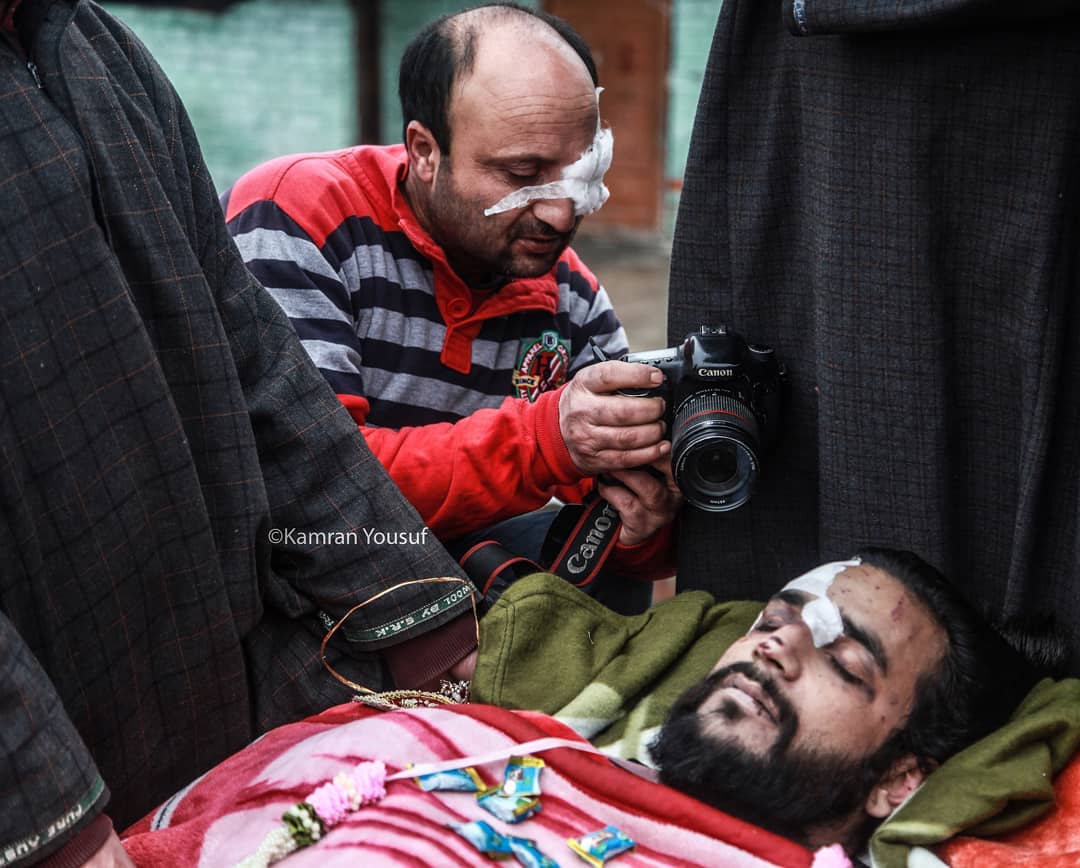On Tuesday, four photojournalists, who were working with local and Indian newspapers, were injured after the paramilitary fired at them with pellet shotguns that pierced their face and damaged their cameras. Journalists covering the Kashmir conflict continue to face the brunt of state violence.
The injured journalists were identified as Waseem Andrabi, who worked with the Indian newspaper Hindustan Times, Nisal ul Haq, of local newspaper Rising Kashmir, and Junaid Gulzar and Mir Burhan, who worked for local organizations.
One of them told reporters that they had raised their cameras to indicate to the paramilitary, stationed in Shopian area, that they were photojournalists. Showing the camera to government forces and moving towards gunbattle sites is normal routine in this disputed region. “This time they showered us with pellets out of nowhere,” another injured photojournalist said.
“We were not carrying guns but cameras. Yet, they fired pellets at us directly. The security forces even fired pellets at the boys who were trying to help us,” Nisal ul Haq stated. “One pellet penetrated the eyelid and slightly scratched the sclera. There are still five pellets inside my eyelid. I can’t see properly and have blurred vision in my left eye. I had three painkillers at once before entering home. I don’t want my family to be worried,” he said.
The Kashmir Press Photographers Association (KPPA) also termed the incident as a “brutal and murderous assault” by security forces. In a statement, the association noted that the oft-repeated assault on photojournalists was “uncalled for” and asserted that the employment of such tactics by the government will not deter journalists from carrying out their professional duties.
In 2018, Reporters without Borders reported India to be among the top five most dangerous countries for journalists. They took cognizance of the incident and said that such attacks are “unacceptable”. “Four photojournalists were deliberately injured by soldiers using pellet shotguns. Only the insane will claim that soldiers are upholding law,” Khurram Parvez, a human rights activist based in the region, tweeted on Tuesday.
Arrested for doing reporting
Almost five months have passed since Aasif Sultan, a journalist working for the Kashmir Narrator, was picked up from his Batamaloo residence in Srinagar city by police for questioning on August 27, 2018.
Initially, the police said that they would take him in custody for six days for questioning but, later, they refused to release him on bail and accused him of “harbouring terrorism and glorifying terrorists”. In the First Investigation Report, they accused him of writing a detailed profile on slain militant commander Burhan Wani to promote militancy (the article is available here: The Rise of Burhan Wani).
Showkat Motta, the editor of Kashmir Narrator magazine, said that police sought disclosure of the sources that Asif used in his report. On January 15, the Committee to Protect Journalists called on the government of India to release Asif Sultan, who the committee said was arrested on false charges. The press advocacy group stressed that reporting on an important and newsworthy story such as the conflict of Kashmir is a public service, not a criminal act.
Before Asif’s imprisonment in September 2017, the National Investigation Agency (which is the counter-terrorism agency of India) arrested freelance photojournalist Kamran Yusuf on charges of harbouring ‘terrorism’ and not covering the “developmental activity of any government department, or inauguration of a hospital or a school, or statement of any political party in power.” He was later acquitted by the court for lack of evidence, after spending six months in jail.





